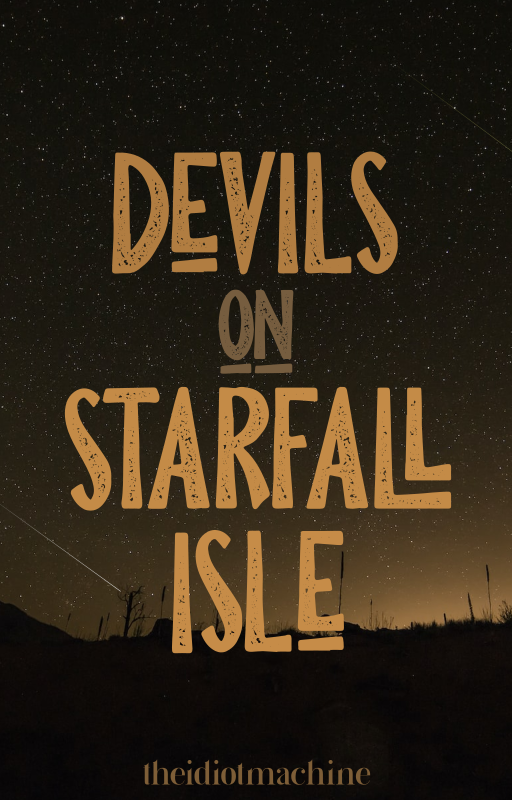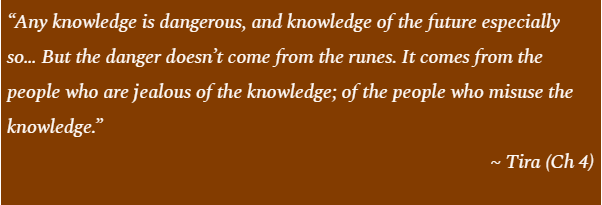DEVILS ON STARFALL ISLE

DEVILS ON STARFALL ISLE
by @theidiotmachine
*see comments for story link
Verity. Her name meant Truth, yet no one believed her.
They come when the balls of fire descend from the sky, hellish creatures roaming the night, slaughtering the puritan settlers of Starfall Isle.
The question readers must consider throughout however, is who the true devils on the isle are.
"The Crucible" meets "The Walking Dead", Devils on Starfall Isle is a fantastical tale rich with atmospheric world-building and visceral descriptions. It encompasses a fantasy world reminiscent of 17th century Salem where the witches on trial are the women who go against the norm and dare to fend for themselves. In this case, quiet, solitary Verity Fisher who endures the taunts and priggish stares of the goodwives and goodmen as she tries to go about her daily life.
For it was a forbidden attraction to another woman that led Verity to settle on Starfall Isle and kept her there.
When an old woman visits the village and warns Verity of impending doom, Verity declines Tira's offer to leave with her, instead choosing to learn from the woman how to make the charms and read the runes that may help protect herself.
It is only when disaster does strike that Verity decides to make her way to the harbour town, hoping to reach the ship that comes after starfall's peak to take her off the island.
Armed solely with the knowledge given her by Tira, Verity's road to escape is fraught with terror and betrayal. Will Verity prevail, let alone survive?
Devils of Starfall Isle is ultimately a tale of female empowerment with underlying themes of the perils of ignorance and abuse of power. Readers may draw eerie parallels to today's world of twisting truths, fake news, and misogynistic governance.
(Review by ELong)

Interview with the Author: theidiotmachine
We learn in the story that runes are not only for forecasting but used as a means for women to learn writing. The ability to share knowledge by carving on rocks and wood is described as women writing "on the bones of the world". It is also likened as creating a fabric that binds the women of the earth together.
Would you agree your story embodies female empowerment? How?
So firstly, thank you so much for your incredibly flattering review! I really appreciate what you wrote.
The core of the idea of the story came from reading about Nüshu. This was a script devised and used solely by women in the Hunan province of China to communicate secretly with each other. It enabled them to have discussions which were not monitored by the men in their lives, and gave them a bit more freedom than they may otherwise have had. You should read about it, it's fascinating.
I wanted to write about a world where such a secret script didn't just relieve women's suffering; it actually let them stand as equals, even in an incredibly oppressive society. So, yes, female empowerment was the cornerstone that the whole thing was built on.
Your story's communities are based upon 17th century Puritan society. Why did you choose to do this?
The Puritans were, of course, associated with the witch trials. These were very much a mechanism of asserting men's dominance over women. It was often financially independent women who were singled out as witches, and their male neighbours could take their possessions after they were tried and burned. As such it made a great setting for the story I wanted to tell.
The other reason was that then magic was both a woman's thing and an evil thing. I wanted a female protagonist who was just a normal, frail person, not able to physically stand up against the horrors around her; but who nevertheless finds the power in her to do so. Magic is a great way of evening the odds, and having that thing be the very thing which damns her in the eyes of her neighbours was a really great foundation to build a story on.
Plus it's not a time period which gets a lot of airing in fantasy; I'm always surprised at how narrowly we focus on European early mediaeval times, even today.
Lastly, the names of the people of the time are so evocative!
Mob mentality influences several pivotal points of the tale. Can we–should we–draw parallels to real world events?
Right. From a certain point of view the society itself is the antagonist in the story, not any one person in it. Every individual is actually doing what they think is the right thing, even Alderman Fletcher, but the collective hysteria is what drives them to making really terrible choices. Except for Gull, obviously, he's just living his best demonic life.
Parallels to real world events? Yes, of course the bit about knowledge that you called out was a little swipe at the way that our relationship with truth and facts is so difficult; and yes, I wanted to ask about the foundations of deeply sexist norms, and where they came from. Europe and North America was once populated by people like that, and I think it informs our societies more than we'd be comfortable admitting.
I will say this, also: I didn't want the Church in this story to be either the goody or the baddy. I think that our relationship with organised religion is complicated and multifaceted, and the witch trials showed it in a particularly ugly way. To make up for that I tried to make the priest be just a person, flawed and lost, but still trying to do the best that he could. His Church may be the reason that this happened, but he's not.
Having said all that... I wanted it to be fun first and foremost and preachy second. So I think can: yes, should: no.
As a male author, what challenges did you face, if any, to write a female MC with the grace and sensitivity that you did?
That's very kind of you to say, and I'm glad you think so.
I don't write women so much as I just write people. And most of the people I write, of whatever gender, are confused and scared and lost, and I have been all of those things so many times that it's easy to pull on my memories to portray that. And at the end of the day, I think we're more similar than we are different and we can all relate to those kinds of emotions. Horror as a genre is particularly good at that, and I dipped into those tropes.
Having said that: yes, I'm male, and I was writing about women's rights, from a woman's point of view, in a very personal way. I was really nervous that I'd stepped out of my lane. I discussed a few aspects of it with my wife, and she was really helpful. I think the key was to make everyone nuanced so that there were no caricatures. They're all trapped. No human is rubbing their hands with glee.
What did you like most about your story?
Honestly? That I managed to pack all that stuff in yet keep it visceral and exciting and immersive. I try to explicitly moralise as little as possible. It's all emergent, and you can actually ignore most of it if you wish and just read it as an adventure.
Plus I was really proud of the twist when (spoilers) Gull eats all the people hiding in the church. It's a nasty moment but it is actually the point that Verity's luck changes, even if you and her don't realise it at the time; and I think that's a neat trick and I want to get better at that kind of thing!
Which moment in the story was the most difficult for you to write? Was there any scene that resonated with you personally?
The bit when she's grabbed by the village and bound up was unpleasant. She's utterly powerless and it's a really horrible thing. I didn't want to go too far, but I didn't want to sugarcoat it either; I wanted it to be brutal and real. And, so, yeah, that wasn't a whole heap of fun to get out, partly because of the subject matter and partly because of the very fine line I'm treading.
Yes there was a scene that resonated with me. It's when Verity is walking alone along the woodland path. I grew up in a very rural bit of Wales, and I remember walking alone at night like that. It's pretty scary even when there aren't devils out to get you. Your prehistoric brain goes into overdrive, convinced there's lions behind every tree. I don't think I did justice to that.
Who was your favourite character to write? Why?
I mean, Gull. Obviously. Unlike all the others who are confused and scared and nuanced, he's like a chainsaw cutting through candyfloss. After the unpleasant claustrophobic events, I could just let rip with him.
Then, I know you asked for one, but Goody Fletcher was also fun. She's clever and manipulative and her story makes her both victim and villain at the same time, which was great to write. Gull has fallen in love with her because of who she is, and she could actually live forever with him as an amoral spirit, having a bloody good time, and yet in the end she chooses not to.
What takeaways would you want readers to have from your story?
I think all writers want their stories to linger in their reader's mind, long after they put down the last page. I think it would be the mental image of Verity huddled down while the stars fall around her and devils prowl the night.
But from an intellectual point of view: as a man, women have had a rough ride of it historically. Knowing about some of the specifics of that will do you no harm at all, and help you understand some of the nasty societal structures that we still have, which in turn, might help us all dismantle them. Which maybe sounds pretentious and mansplainy, in which case I apologise.
Also, if you write fantasy, find a cool period!
What's next for you story-wise?
A lot! I have a bunch of non-fiction stuff coming out; my first self-published book, Edit Like You Stole It, will be on Amazon in July. That's an expanded and much polished version of my Idiot's Guide to Line Editing, which is a guidebook to the basics of editing fiction. I'm really happy with it: it's fun and funny and useful. Then I'm busy writing a whole load of essays on writing fiction as companion pieces to that, which I'm publishing on (whisper it) a rival website to Wattpad, called Kerning.
Fiction-wise: I'm going back to the novel I wrote a while ago. It's called The Song of a Poisoned Star. When I wrote it, it was the best thing I'd ever written, but between now and then I've really upped my game, and so when I came back to it, I winced a little and started editing it from the beginning. I think I'll put it up on Wattpad fairly soon and then publish it on Amazon, maybe early next year. And of course I write a story for the Tevun Krus crew most months, and I'm currently waiting for the results of this year's ONC: my submission is a science fiction novella called I Fell From the Dark. So, lots of stuff! I love writing, both fiction and non-fiction, and it's lovely to be read.
And on that note: thank you so much for reading my strange, dark story, and for talking to me about it in such depth! It was a real honour.
Bạn đang đọc truyện trên: AzTruyen.Top